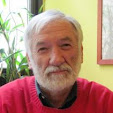 I stand corrected on all my previous references in this blog to seaweed. I just learned courtesy of the Aegean Institute here on Paros that all those pieces of plant seen after high winds washing around our rocks and beaches are actually Posidonia (fykiadha in Greek), a grass that is related to the palm tree.
I stand corrected on all my previous references in this blog to seaweed. I just learned courtesy of the Aegean Institute here on Paros that all those pieces of plant seen after high winds washing around our rocks and beaches are actually Posidonia (fykiadha in Greek), a grass that is related to the palm tree.
It's main value is that it produces a high amount of oxygen; up to 20 litres per square metre per 24 hours--for those of you who don't know liters and meters, that is a lot. Historically the Posidonia blades have been used for insulation and fertilizer. In our snorkeling we see many meadows of this grass; the water is so clear it grows in great depths. Learn more at the Aegean Institute web site
Also I have written before about Greece dragging its heals on adopting laws to allow freer flow of goods, services and people within the EU. Recently the European Court in Brussels ruled against Greece's used car tax which taxed cars bought outside the country much higher than those bought within Greece. (This and the next story from Athens News Agency.)
Greece is making great strides in infrastructure construction and not just within Athens. Thessalonica, the business capital in northern Greece, how has a 98 km suburban railway that can reach speeds up to 160 km per hour (59 miles and 96 mph).
Finally, I have not previously written about the fires in Greece this summer because I found readers knew more about what was happening than I did. But now chances are that follow-up reporting has fallen off the international media horizon. A recent report by the Fire Service estimated a 30% rise in arson this summer. Yet only 14 of the 137 fires in the Peloponnesus were caused by arson they say. The Fire Service investigators have not found evidence of an organized plan behind the fires. I am sure we will hear more from all sides, however.
Stay tuned.
An American-Irish expatriate couple share their Greek island experience by offering content, links and photos about Paros, the Cyclades, Greece and the world of living abroad.
Now blogging on main site
About Me
Followers (Join in to make this list longer!)
Subscribe Now
Comments
Relevant comments are encouraged; they are made
DOFOLLOW for the Google and other spiders.
Comments are moderated.
Spam will not be tolerated.
DOFOLLOW for the Google and other spiders.
Comments are moderated.
Spam will not be tolerated.
Labels
Blog Archive
Links
Other Greece Blogs
Other Blogs of Note
Amazon has everything !
Copyright 2006 | Blogger Beta Template by GeckoandFly and Blogcrowds | Design by Andreas Viklund
No part of the content or the blog may be reproduced without prior written permission. Original content copyright by Michael Shepherd: 2005 - 2024.
No part of the content or the blog may be reproduced without prior written permission. Original content copyright by Michael Shepherd: 2005 - 2024.
